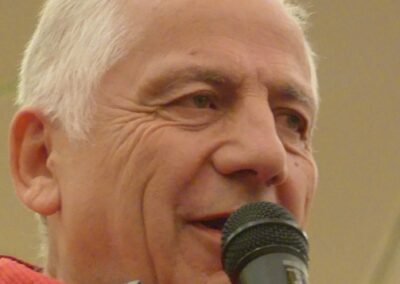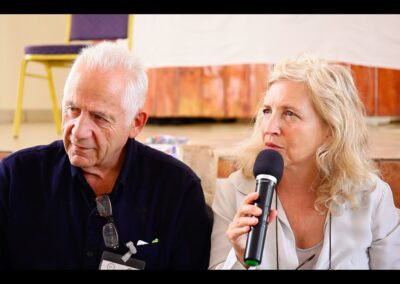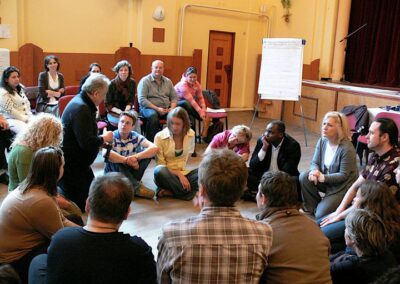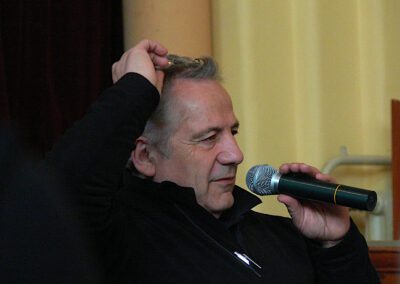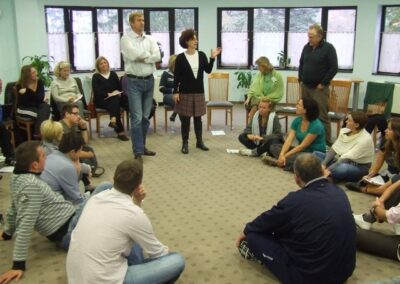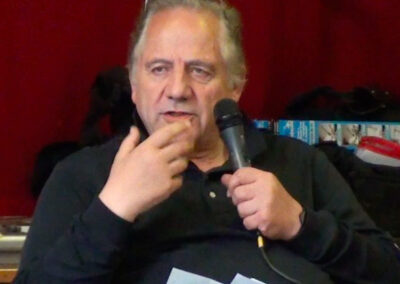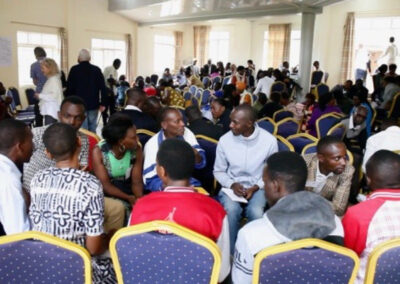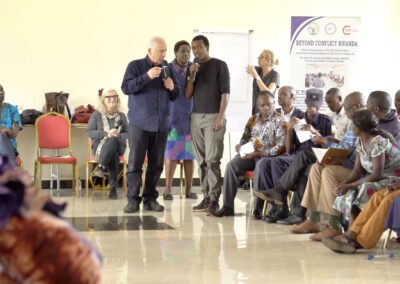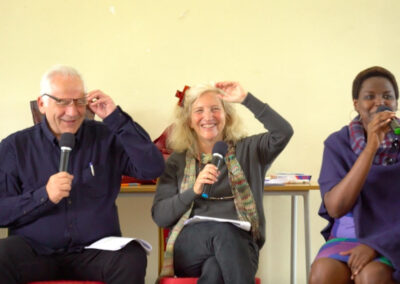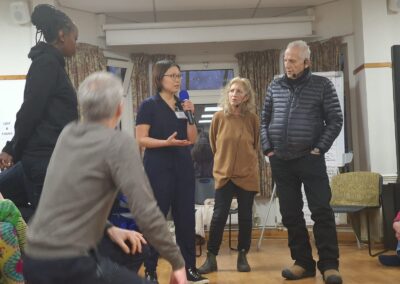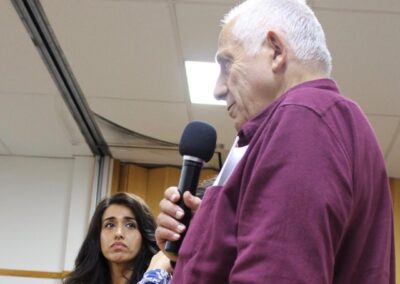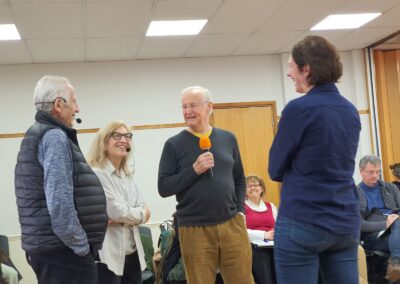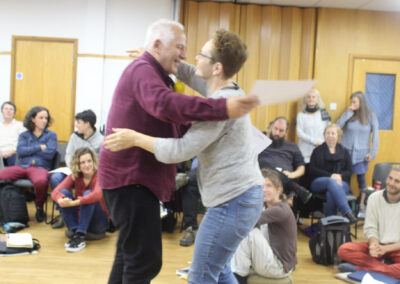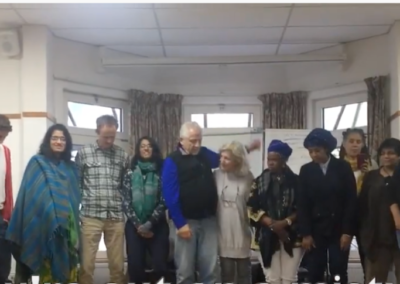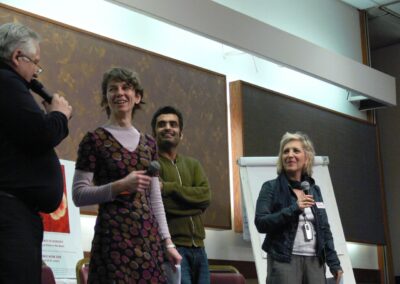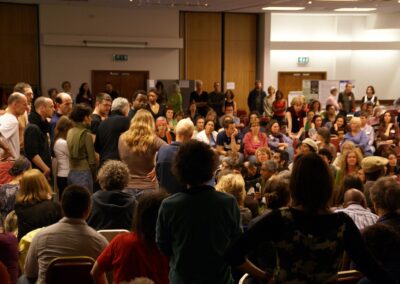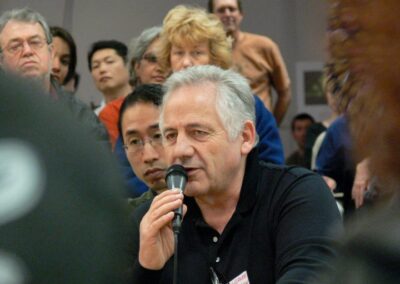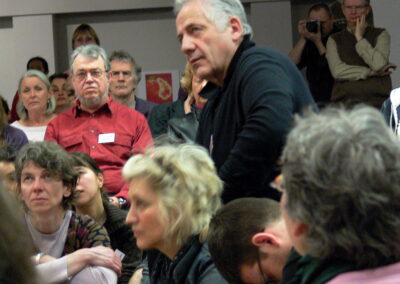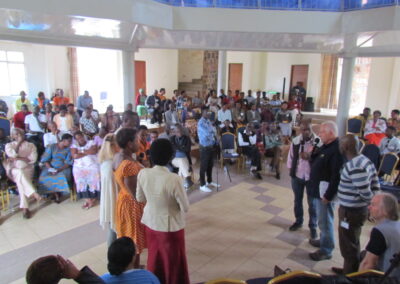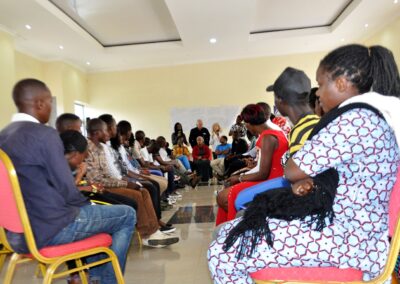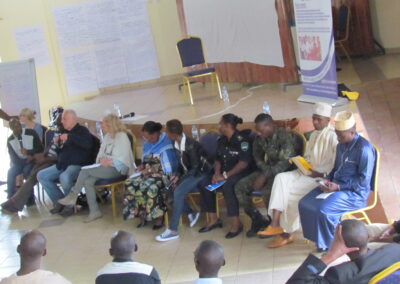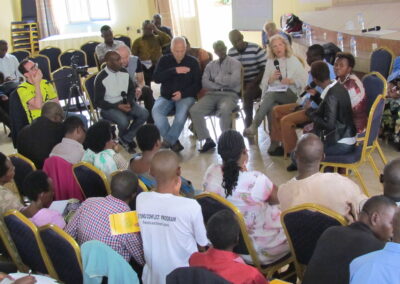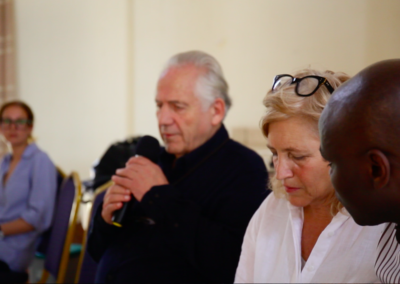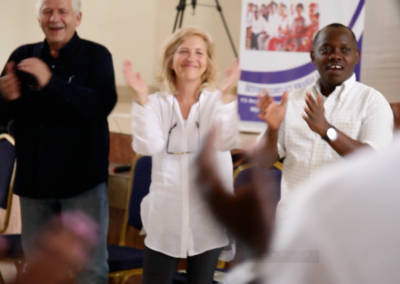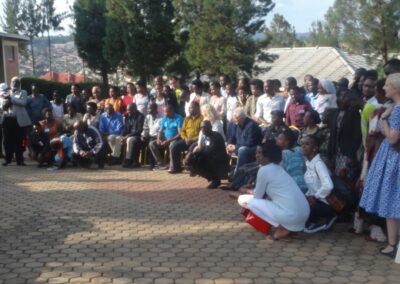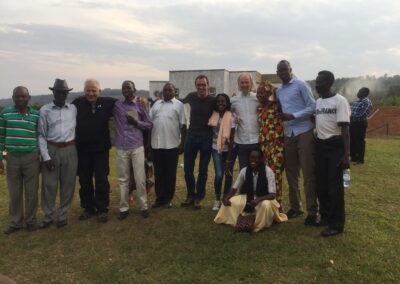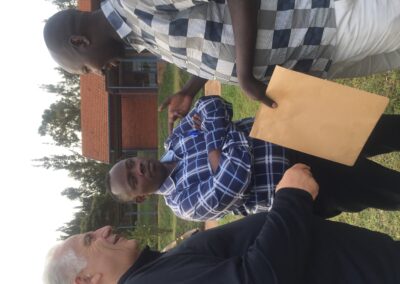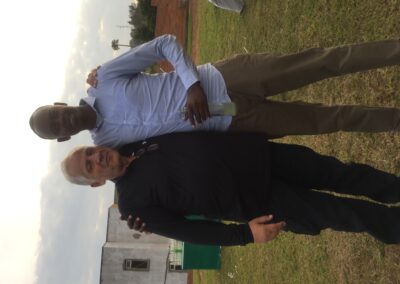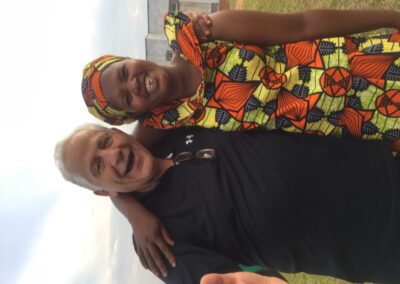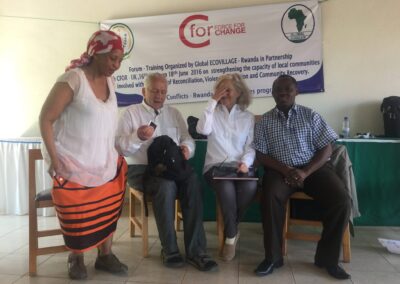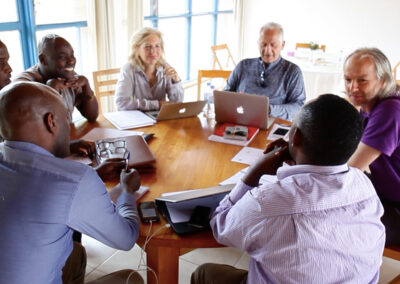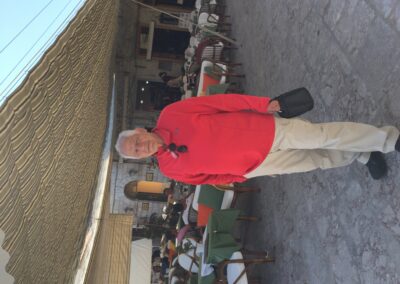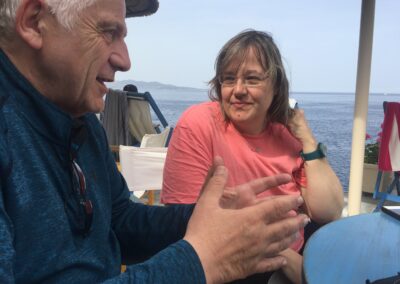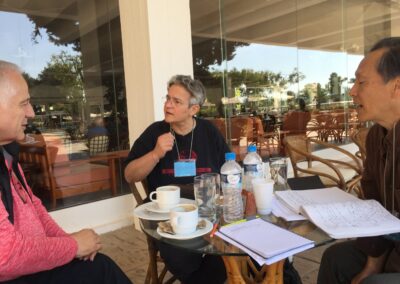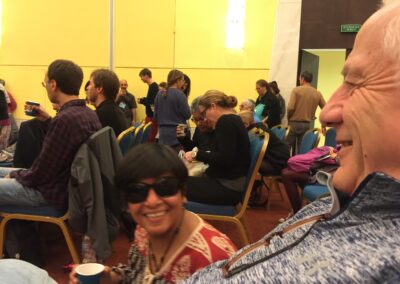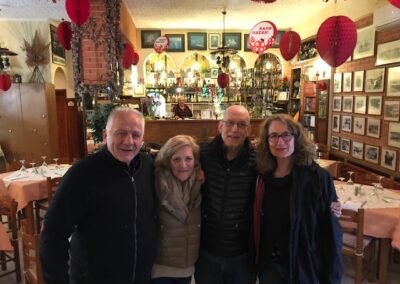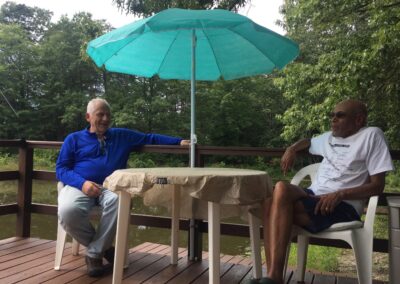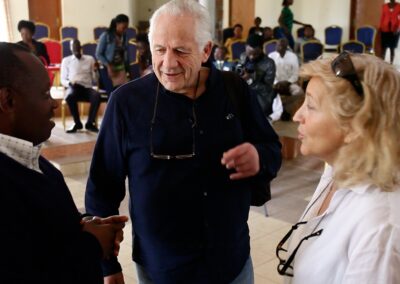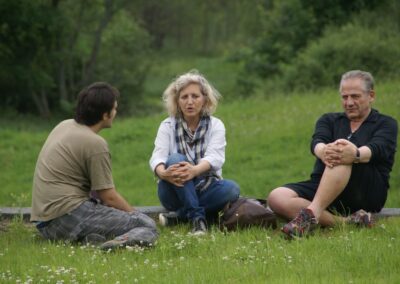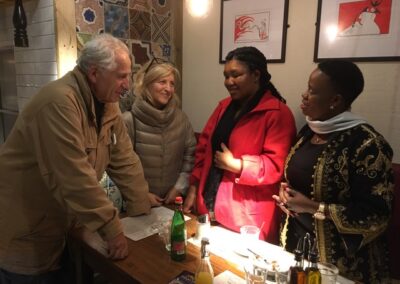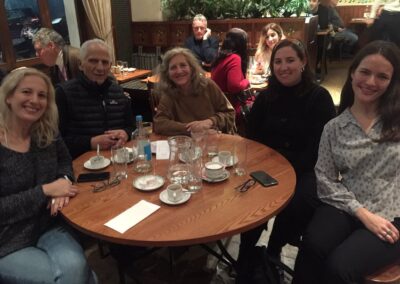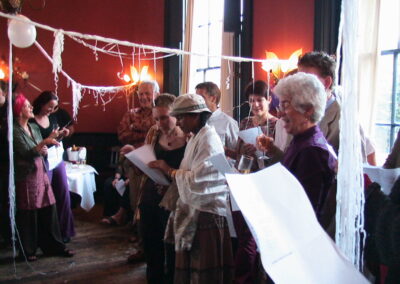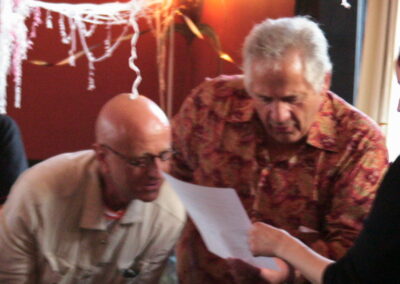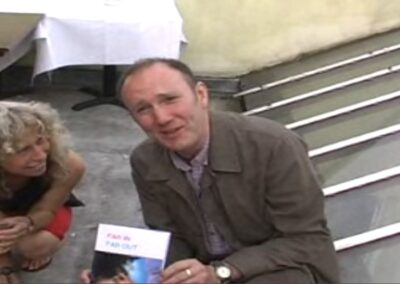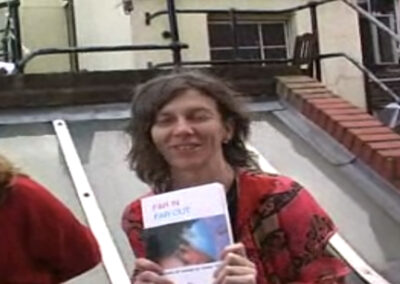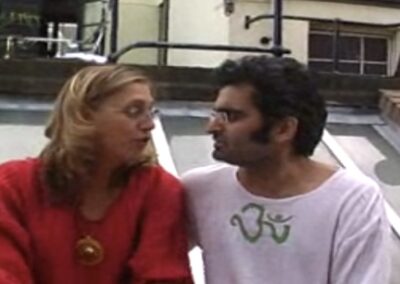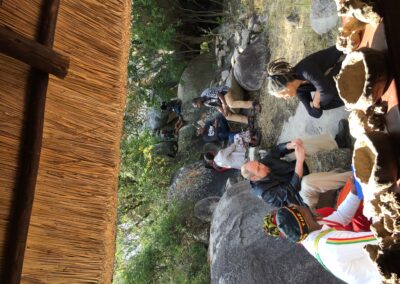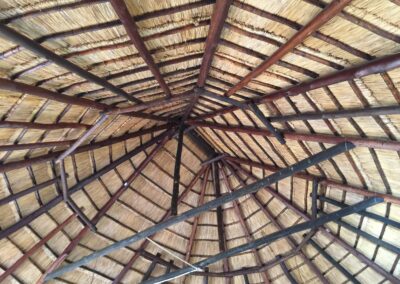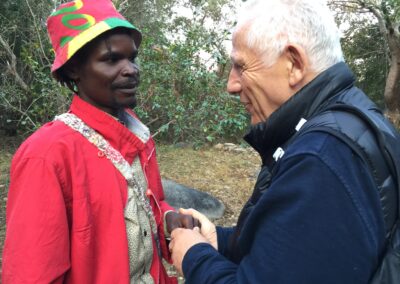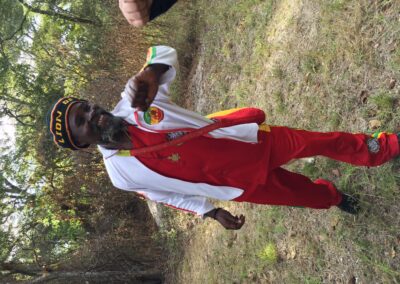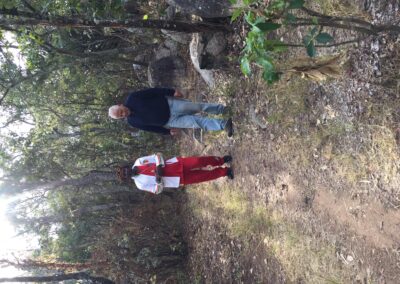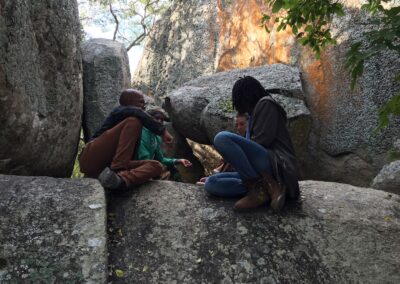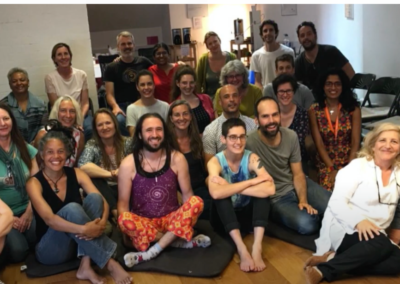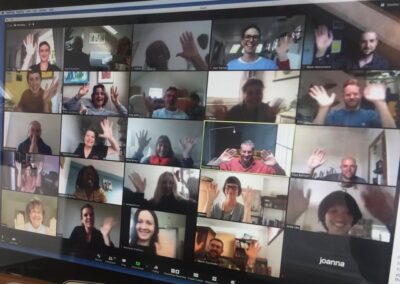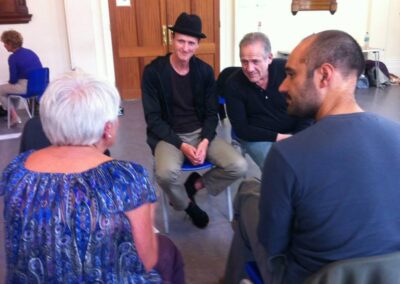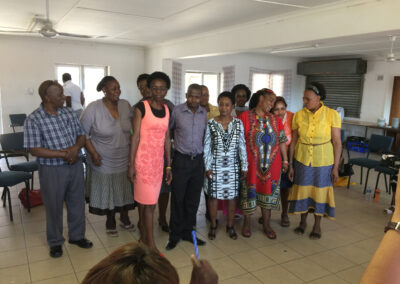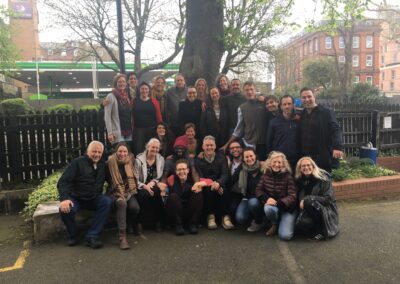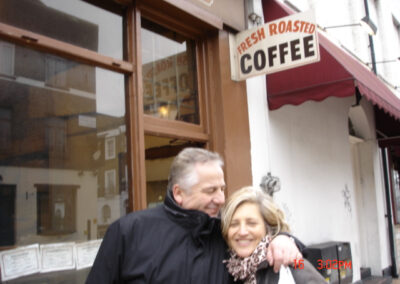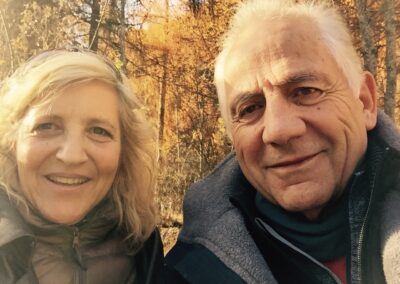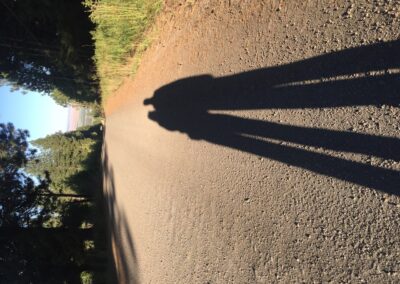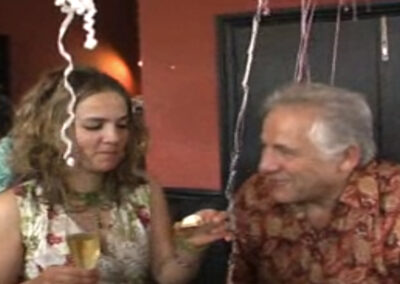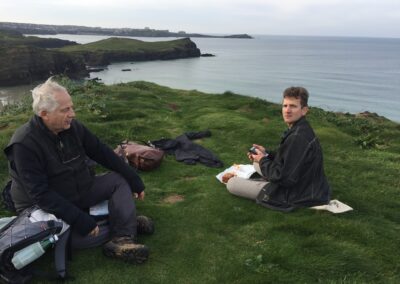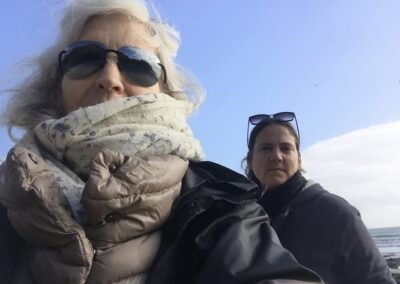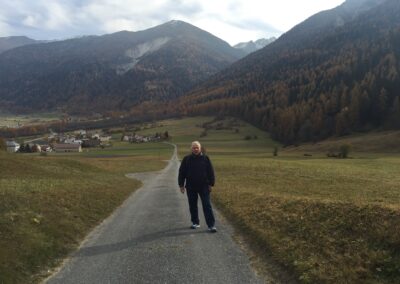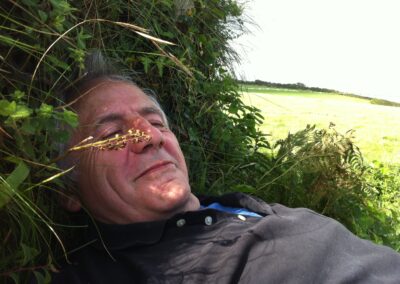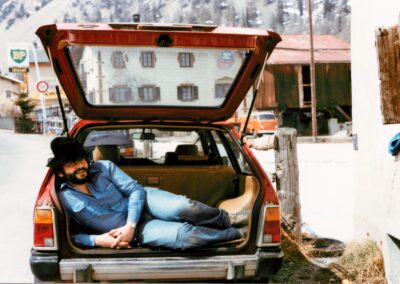In celebration of Jean-Claude Audergon, co-founder of CFOR, beloved partner, father, mentor, teacher, and friend. Jean-Claude passed away on October 27, 2020, age 74. He was at home in Cornwall with Arlene and his daughter Lea by his side.
I, Arlene, (JC’s wife, friend and partner in our work for 35 years, and co-founder of CFOR), am touched by the outpouring of your messages, love and gratitude to Jean-Claude. And I thank you for your care for me, and for JC’s children, Andri and Lea, and his family.
Jean-Claude and I used to talk about how, after someone dies, their very essence and gifts come into clear focus.
In your messages, you describe JC’s rare combination of strength and gentleness. You describe his playfulness and mischief. He was unmovable, the eye of the storm, making you feel that anything is possible. He was sometimes impossible, never quasi-evenhanded. He’d enter a conflict, then turn himself inside out to understand the other side to try to process the whole interaction.
An important strand of Jean-Claude’s life work has been facilitating communities facing trauma following gross injustice or violent conflict. At his essence was a devotion to learning – to constantly grow in his own awareness and to more accurately perceive and be alongside others.
Over the years and since his illness in summer 2019, Jean-Claude focused fully on his health, by way of exercise and nutrition, along with awareness of his body and sentient experience, dreams, outlook and limits. Again and again, his deepest inner work would link him back to the world, to stay strongly engaged in his work.
Early this year (2020) he and I co-facilitated a 9-day Intensive training course on facilitation, ‘The World Inside Out’, with more than 100 people. The course focused on this link between inner work and worldwork. This was just before COVID hit, and we continued our training programme online.
Jean-Claude had been doing well, when his health turned rapidly, so there was little time for goodbyes. He lived life to the fullest up to his last hours, always discovering the next process arising in him. Just 2 days before he died, he was up early, at his desk, beginning to write a book. On his last day, he spoke passionately about his wish for all of us to deepen and sustain our commitment to addressing and transforming the deep-seated dynamics of structural racism and discrimination.
And on his last day, he said to me “Listen: if I give you my hand, will you extend it for me – And you will include all of us.”
After he died, I caught a glimpse of him… walking briskly, ruddy, in his 40s, busy, heading into a project of some kind … His pace was fast, but unhurried, congruent with this vitality. He had a big wide smile, across his face, where he has a dimple. He waved. I waved back.
That glimpse of Jean-Claude gives me solace, to know that he is continuing on – whether onto his next project in another realm, or that his life and spirit carries on through many of us.
For those who are interested, I summarise some of Jean-Claude’s life and work below. As you read, I know that some of you will share in memories, or recall other work that you have done together as a team, or with his mentoring.
A dream led Jean-Claude…
A dream led Jean-Claude to Psychology. In the dream, he buries his own head in the sand, and in the place of his head is a book. He’d been inspired by a book on Psychology and began what became his life long search to deepen his awareness.
Jean-Claude was the youngest in a large family with 8 brothers and sisters, among the 10 poorest families in Fribourg. Along with grappling with all of the difficulties of poverty, early on, his father spotted and encouraged Jean-Claude’s love of learning. His mother worked tirelessly to support his education. He would go to live for periods in the UK with his brothers, and learned to speak English fluently, in addition to speaking German and French. He lost his father at 14, and was alongside his mother for years as she struggled with illness, and as she died in his arms when he was 18.
Jean-Claude completed Hotel School, and in his 20s went on to study Medicine and Journalism, and finally focused on Psychology. He later received the Liz. Phil. I. degree in Psychology from the University of Zurich.
Til his last day, he spoke passionately about the joy of study and learning. He took to heart what he felt was an extraordinary gift to have studied Process-oriented Psychology over 40 some years with Arny Mindell, who became a life-long friend and colleague. Jean-Claude felt that his studies made it possible for him to be able to facilitate himself and others in extremely difficult situations, and brought him such joy of life. This made him want to pass on this gift to others.
He was among the early students of Processwork in Zurich in the 70s, and among the founders of the Research Society for Process Oriented Psychology in Zurich in the early 80s. In the late 80s, together with his own students in the UK, Jean-Claude co-founded The Research Society for Process Oriented Psychology UK, now called Processwork UK, and its accredited Psychotherapy Training. He also supported the initiative and development of several other training programmes internationally, including in Slovakia and most recently the new Processwork Institute in Germany. Jean-Claude also helped initiate and establish IAPOP the International Association of Process Oriented Psychology. He led up the teams who coordinated the first IAPOP conference in London in 2007 and the 2008 Worldwork conference in London.
He mentored our students and colleagues in Processwork UK, and gave training and Intensive courses continually over the decades. Through the years, together with colleagues, he also led the development of the organisation. And until his very last day, he was pitching in and providing eldership to the school, led by Anup Karia, Iona Fredenburgh, faculty and RSPOPUK committee.
One of Jean-Claude’s vital contributions was in the area of mental health and extreme states. He worked with the Social Services in Switzerland, on a psychiatric unit. Then, he was invited by Dr. George Mecouch to lead a project in the Psychiatric ward of a large hospital in the US. With the initiative of Sheila McClelland and others, he went on to conduct large training seminars over many years in a Psychiatric hospital in the UK.
These unique seminars were seen as radical, because they included in-patients and psychiatrists, mental health staff and students. We worked deeply with individual patients and with professional staff. We also facilitated community forum interactions, inviting patients, staff, NHS management, family, housing authorities and police. It was a time of profound learning for all of us, shifting attitudes about how we perceive mental health in our community. We later co-facilitated board meetings and large forum gatherings within another NHS trust, among the board, NHS staff and management, dealing with an acutely difficult time of organisational transition.
Jean-Claude began following his interest in studying dynamics of violence during the 80s. He worked as supervisor for the Social Services of the Justice Department of the County of Zurich, and one of his roles involved supervising a team working with prisoners.
He tells a story about a particular prisoner he was asked to work with. The team was afraid of him because of his violence. JC talked with the guy a while and asked if he would be willing to try an experiment. JC put up the palm of his hand, and invited the guy to punch. The prisoner said okay, and punched with real force – but stopped – a millimetre away from his fist hitting JC’s hand. Jean-Claude told him how impressed he was with his physical awareness, sensitivity and care. The prisoner began to cry – he said no one in his life had ever seen this quality in him before. Part of the beauty of this story is that it exemplifies how bringing awareness to subtle signals can transform difficult situations. But, it also exemplifies how JC could make you feel when he perceived and noticed your gifts and potential.
Another key area of JC’s work has been working with people with serious illness, and processes of living and dying. The approach developed by the Mindells to communicate with people who are in deeply altered states and comas made it possible for Jean-Claude to communicate with his own son, who was in a coma at the age of 6 following an accident and during his recovery. Jean-Claude wanted to pass on his experience, and trained others to be able to communicate with their patients and loved ones in coma.
Jean-Claude also loved working with artists. He initiated the Arts Atelier in the UK and had great fun working with companies and individual actors, musicians and improvisational opera – working with the creative process, creative blocks, and the interplay of personal and collective processes. In the mid 90s he completed film school at NYU New York University.
As a younger man, back in Zurich, he helped coordinate the ‘Monday Evening of La Fourmiere’ at a well-loved theatre location. ‘La Fourmiere’ was a group of 20-30 artists active on the Zurich scene, making it possible for singers, songwriters, poets, fiction and political writers, painters, cabaret artists, stand-up comedians, and alternative theatre groups to have a public audience. There were also evening forums, where over 200 people would convene with local politicians and young alternative political activists to debate in Round-Table the issues on the front page of local newspapers.
This early interest in facilitating community interactions remained constant over the decades. He facilitated within many organisations and communities, using ‘worldwork’, the application of Processwork to working with groups.
Jean-Claude inspired and trained many facilitators over the years, in their work in psychotherapy, organisational facilitation, conflict resolution, reconciliation, and social justice. He gave a modular training course for organisational consultants in Los Angeles, then in Berlin. During the last decade, he co-led CFOR’s Facilitation for Leaders annual course, along with annual Intensive courses, focusing on the link between inner work and worldwork.
Facilitating interactions around current issues in community touches on historic and current injustice, violence, collective trauma, and entrenched dynamics of structural racism and discrimination. Jean-Claude was devoted to facilitating these dynamics in the spirit of ‘deep democracy’ and finding ways to access the potential in communities to transform.
In Los Angeles, in the early 90s, he led up the coordination of a large conference on racism in Compton, ‘Privilege, Prejudice and Power’, as well as being part of the facilitation team, including John L and Gladys Johnson, Arny and Amy Mindell, David Jones and other colleagues.
In Germany, in the early 90s, he facilitated training seminars and forums, focusing on xenophobia, racism and nationalism, particularly issues facing refugees and asylum seekers.
During the mid 2000s, JC coordinated and co-led several programmes called ‘Europe Matters – You Matter’ (He insisted on including ‘You Matter’) in partnership with ANNWIN and supported by EU grants. In Slovakia and in the UK, we held large gatherings of diverse groups of participants from 30 countries to process and transform our relationships and historic and current polarisations. We worked with our history and legacy of colonialism, World war I and World war II, the holocaust, anti-Semitism, Islamophobia, issues of asylum and migration, the legacy of Stalin, polarisations in the Balkans, and our relationships in Europe between East-West, North-South.
JC was also deeply involved in facilitating our work over many years in the Balkans. From 1996-2001, he advised and supported the work of Arlene and Lane Arye in Croatia. From 2006-2012, Jean-Claude co-facilitated a new phase of the project, a partnership between CFOR, Association Mi and UNHCR. The focus was on blocks to economic recovery – combining facilitated community forums with economic project development.
In South Africa, Jean-Claude was delighted to see the initiation of ‘Imbewu’ (‘’Seed’) a small grassroots Association that formed spontaneously in the middle of a group process, during a deep and lively Forum that we facilitated in Chesterville, Durban. This project was initiated by Lungile Nkosi-Hill, who studied with Jean-Claude in the UK. She was inspired to bring her learning back to the township where she’d grown up. Her dream is to contribute to processing the legacy of Apartheid, and to supporting the wisdom in community.
In Zimbabwe, Jean-Claude and I were invited to support our colleagues from Kufunda, and Gateway, a consortium of 3 organisations, doing vital work to support communities, and with a dream to foster a national reconciliation process. We had the opportunity to facilitate an extraordinary Forum in 2018. It began with some participants being frightened to be together in the same room. As they interacted together for the very first time about the history and legacy of violence, a sense of possibility emerged to create a different future. Our colleagues in Zimbabwe are continuing to support and train community facilitators.
Lastly, CFOR’s work in Rwanda began in response to an invitation from Innocent Musore of GER to be a Partner, and to mentor him in developing a programme to support the country in its reconciliation process, From 2016 – present, we facilitated 5 large forums among perpetrators and survivors of the 1994 Genocide against Tutsi, and ran a mentoring and training programme for a smaller group of 50 selected participants.
Now, even in these times of COVID, when we cannot gather in large groups, the community facilitators that we mentor are showing extraordinary passion, commitment and skills. They are facilitating property disputes; facilitating interactions between survivors and perpetrators; among women; among youth, including the issues faced by youth born from rape; and between youth and elders.
The programme is deeply appreciated by the participants and those who they go on to influence, as well as the Rwandan government.
Each time we were in Rwanda, Jean-Claude felt personally moved by the friendship and welcoming spirit we received, and by the great courage and sense of possibility that people in Rwanda model for all of us around the world.
Jean-Claude also created a series of films about our work in Rwanda, with filming and co-editing by Daniel Johnson. In recent weeks, JC had been working on editing some interviews and film material from Rwanda to help put our work in context, and to think about ways to do our part to contribute CFOR’s work to the larger field of peace-building and genocide prevention.
Jean-Claude’s inspiration and legacy at CFOR…
When I sat down to write about Jean-Claude for CFOR, I meditated on his inspiration and his legacy. I kept recalling a conversation that we‘d had over coffee many years ago. JC said it was important to name the work you are doing, and to name an organisation. He said it was like naming a child. Giving a name honours that this entity will have its own purpose to fulfill.
The name itself came from an earlier iteration. I was sitting at a small outdoor café in Pristina, Kosovo in 2001, with our colleague and good friend Lane Arye. We’d been facilitating community forums in Croatia since just after the war from 1996-2001. We’d often seen vehicles of the international peace-keeping forces, SFOR (Stabilization Force) and IFOR (Implementation Force). Now, KFOR (Kosovo Force). I imagined aloud, what about PFOR Process Force… Well, this name didn’t fly!
But, over that coffee with JC some years later, we named our work CFOR for Community force. If communities can gather, interact, and process historic and current injustice and community trauma, in order to deepen our relationships, awareness and sense of community, this is a transformative force – a protective force against being pulled apart into polarised positions and new rounds of violence. We understood community force, not as a power or military force, but as a life force.
Jean-Claude, as I feel the depth of my sorrow, I feel you near – your love, generosity, ease, stillness, and your persistence to reach the core of things.
You constantly modelled for me, and for all of us at CFOR, how to stay close to our deepest purpose while building the structures that make our ongoing work possible.
We love you, hounour you, and are so grateful to know that you will always be with us.
